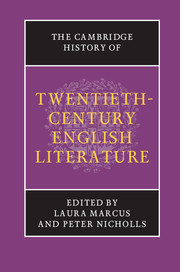Book contents
- Frontmatter
- Introduction
- PART ONE WRITING MODERNITY
- PART TWO THE EMERGING AVANT-GARDE
- PART THREE MODERNISM AND ITS AFTERMATH, 1918–1945
- PART FOUR POST-WAR CULTURES, 1945–1970
- PART FIVE TOWARDS THE MILLENNIUM, 1970–2000
- 32 The Seventies and the cult of culture
- 33 Feminism and writing: the politics of culture
- 34 The half-lives of literary fictions: genre fictions in the late twentieth century
- 35 Theatre and politics
- 36 Irish literature: tradition and modernity
- 37 Scottish literature: Second Renaissance
- 38 Towards devolution: new Welsh writing
- 39 British–Jewish Writing and the turn towards diaspora
- 40 Fiction and postmodernity
- 41 Postcolonial fictions
- 42 Writing lives
- 43 Poetry after 1970
- 44 Ending the century: literature and digital technology
- Bibliography
- Index
- References
44 - Ending the century: literature and digital technology
from PART FIVE - TOWARDS THE MILLENNIUM, 1970–2000
Published online by Cambridge University Press: 28 March 2008
- Frontmatter
- Introduction
- PART ONE WRITING MODERNITY
- PART TWO THE EMERGING AVANT-GARDE
- PART THREE MODERNISM AND ITS AFTERMATH, 1918–1945
- PART FOUR POST-WAR CULTURES, 1945–1970
- PART FIVE TOWARDS THE MILLENNIUM, 1970–2000
- 32 The Seventies and the cult of culture
- 33 Feminism and writing: the politics of culture
- 34 The half-lives of literary fictions: genre fictions in the late twentieth century
- 35 Theatre and politics
- 36 Irish literature: tradition and modernity
- 37 Scottish literature: Second Renaissance
- 38 Towards devolution: new Welsh writing
- 39 British–Jewish Writing and the turn towards diaspora
- 40 Fiction and postmodernity
- 41 Postcolonial fictions
- 42 Writing lives
- 43 Poetry after 1970
- 44 Ending the century: literature and digital technology
- Bibliography
- Index
- References
Summary
To combine questions of ‘endism’, literature and technology is a particularly risky endeavour. There is always the chance of making the mistake of repeating the overheated millennial rhetoric of much 1990s cultural theory on these issues. Having survived the millennium bug, the armfuls of handbooks on cyborgs and how to become posthuman, and sullenly acknowledged (despite what Jean Baudrillard promised) that the year 2000 really did take place, there is still the lure of that minatory discourse on the ‘fate’ of literature in this end-time. To be dragged into the noisy declamations of the prophets of the end or new beginning of the book is to lose critical distance just when it is most needed. Then again, precisely how is distance to be attained when it is evident that the Third Industrial Revolution – the digital one – is still only just starting to unfold? The history of technology is littered with unpredictable trajectories and wholly unforeseen applications, and given the accelerated cycles of technological innovation and obsolescence, the transience of current forms of digital technology is always painfully clear. Speed of change is something that, as Leo Marx has observed, encourages technological determinism, a mode of thought that ‘invests technologies with enough power to drive history’. With all these risks, any claim to authoritative statement can often seem to be just a symptom of the technoculture it had hoped to master.‘Increasingly’, Friedrich Kittler claims, ‘data flows once confined to books and later to records and films are disappearing into black holes and boxes that, as artificial intelligences, are bidding us farewell on their way to nameless high commands.
- Type
- Chapter
- Information
- The Cambridge History of Twentieth-Century English Literature , pp. 787 - 805Publisher: Cambridge University PressPrint publication year: 2005
References
- 1
- Cited by

